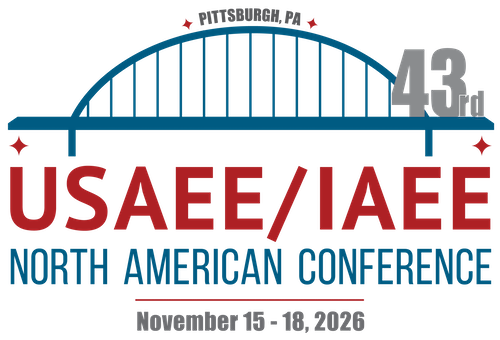Call for Papers
Concurrent session submissions for the 43nd USAEE/IAEE North American Conference, which will be held November 15–18, 2026, in Pittsburgh, Pennsylvania, have not yet opened. Submission dates and additional instructions will be available here once announced.
Concurrent sessions at the conference allow students, academic faculty and staff, energy economists, and practitioners who are working in business, government, and research communities to present current analysis, research, or case studies on topics that are related to energy economics and markets. Presentations may be based on academic papers, but this is not a requirement. Presentations are intended to facilitate the sharing of both academic and professional experiences and lessons learned. Full details can be found below.
Submission Information
USAEE accepts submissions of full sessions and individual works.
Full Sessions
USAEE encourages interested participants to submit full sessions, which consist of individual presentations that are focused on a unifying theme, for consideration. Full sessions must have a minimum of three presentations but should aim to have four presentations. Full sessions can include paper presentations or panel discussions. The USAEE reserves the right to add a fourth presentation to a session that includes only three.
Please contact USAEE Vice President of Academic Affairs Jamal Mamkhezri for details regarding the submission of a full session.
Individual Works
An individual work may be based on a full paper or on an abstract only. Abstracts should be concise and communicate clearly the work’s contribution. Full papers should include a cover page with an abstract and author names and affiliations. If accepted, USAEE will organize individual works into sessions. Individual works may be submitted via online form to be shared here.
Student Opportunities
A presented paper or poster presentation that is based on work done primarily by one or more students (the IAEE definition of a student is available here) is eligible for Best Student Paper and Best Student Poster awards. Authors of submissions that fit these criteria will be contacted regarding award nominations. Students who indicate interest in the Best Student Poster award will also be considered for a full presentation, space permitting.
Conference Attendance
At least one author of an accepted presentation must pay the registration fee and attend the conference in person to present the work. Each speaker may present only one work at the conference but can be coauthor of multiple presented works.
Submission Deadline
The deadline for receipt of full sessions and individual works will be shared here when available. Authors will be notified of acceptance on a date to be announced.
Additional Conference Opportunities
Questions / Additional Information
For all inquiries, please contact Jamal Mamkhezri.
Topics of Interest
Contributions cover all areas of energy economics including, but not limited to the following list that is based on the scope and topics that are covered by the IAEE’s two journals, The Energy Journal and Economics of Energy & Environmental Policy.
- Energy and environmental issues or policy
- Petroleum
- Electricity or energy markets
- Energy, environment, and developing countries
- Natural gas
- Gasoline demand analysis
- OPEC+ and oil markets
- Renewable energy
- Coal
- Distributed generation
- Econometric modeling
- Alternative transportation fuels
- Energy efficiency
- Regulatory economics
- Energy taxation
- Market power or competition policy
- Interfuel substitution
- Nuclear power
- Transportation and transportation policy
- Emissions trading (e.g., SO2 and CO2)
- Carbon-emissions reduction
- Objectives and instruments in climate policy
- Infrastructure regulation and regulatory policy
- Institutions for policy formation and enforcement
- Sustainability of energy systems
- Energy systems in city planning
- Demand response
- Energy security
- Technology and innovation policy
- Natural-resources policy for energy-extractive industries
- Taxation and fiscal policy
- Private-public partnership in energy industries

